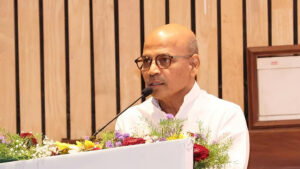In a major development in the ongoing education scam investigation, the key accused has been remanded in police custody remand (PCR) for further interrogation and evidence collection. The move comes after a series of coordinated raids, document seizures, and witness statements that have begun to unravel what authorities believe is a well-organized racket involving fake degrees, forged academic credentials, and fraudulent educational institutions.
This case, which has been under the spotlight for several weeks, is yet another example of the growing and deeply troubling trend of academic scams in India. With education playing a critical role in shaping careers and livelihoods, the manipulation of academic systems by a few corrupt actors is having wide-ranging consequences—not only for the individuals directly involved but also for the credibility of institutions, the fairness of recruitment processes, and the futures of thousands of students.
The Arrest and PCR Remand: What It Means
The accused, identified as a central figure in the education scam, was apprehended following a series of complaints and a long trail of evidence pointing to his involvement in the fabrication and sale of fake academic certificates. Upon arrest, police moved the court seeking police custody remand (PCR), arguing that custodial interrogation was essential to uncover the full extent of the operation, retrieve digital evidence, identify other accomplices, and locate financial transactions linked to the fraud.
The court, considering the gravity of the charges and the preliminary evidence submitted, granted the request. The accused has now been placed under PCR, allowing law enforcement authorities to question him intensively and extract critical details that could lead to further arrests and the dismantling of the wider network.
The Scam Uncovered: A Complex Operation
The education scam at the center of this investigation is far from a small-scale forgery incident. Preliminary findings suggest that the accused had been operating a multi-layered syndicate that issued fake degrees, mark sheets, course completion certificates, and even institutional accreditation letters. These documents bore the names and logos of reputed universities and educational boards from across the country.
The racket operated under the cover of a “distance learning consultancy” and “education support center,” offering fast-track degrees, pre-dated certificates, and academic records for a fee. Prices varied based on the degree type—ranging from diplomas to postgraduate degrees—and the prestige of the educational institution being imitated.
Clients included job seekers, immigration aspirants, working professionals hoping to boost their resumes, and in some cases, individuals who knowingly bought fake degrees to apply for government jobs. According to police sources, hundreds of forged documents were issued over the past few years, some of which may have already been used to secure employment or admission.
Trail of Evidence: What Police Have Found So Far
During raids conducted at the premises linked to the accused, police recovered a substantial amount of incriminating material, including:
-
High-quality printers and lamination equipment
-
Stamps, seals, and holograms resembling those of real universities
-
Laptops and pen drives with templates of certificates
-
Fake mark sheets, ID cards, and digital transcripts
-
Ledger books and transaction records
-
Names and contact details of clients and intermediaries
Investigators are now examining the recovered digital devices for communication records, payment receipts, and client databases. Some of the data points to a larger interstate or possibly international nexus of fake education services.
Consequences for Students and Professionals
One of the most disturbing aspects of the case is the number of individuals who may have unknowingly become complicit by purchasing degrees from the accused’s network. Many of these individuals could face legal action or lose their jobs, especially if they used forged credentials in official or government settings.
Even more tragically, some clients were reportedly unaware that the certificates they received were fake. They believed they were engaging in legitimate distance learning or certification programs, having paid substantial amounts for what they thought were genuine academic services. Now, they find themselves caught in legal uncertainty, their careers and reputations hanging in the balance.
Broader Implications: A Crisis in Educational Integrity
The remanding of the accused into police custody may be a step forward in bringing justice, but it also highlights the broader challenges plaguing India’s education ecosystem:
-
Proliferation of Unregulated Institutions: There has been a surge in private institutions offering dubious degrees under the guise of online or distance education. Many operate without proper affiliations or recognition, preying on students from rural and semi-urban areas.
-
Weak Verification Mechanisms: Employers, educational authorities, and government agencies often rely on paper-based documentation without cross-verifying with the issuing institutions. This lack of centralized verification infrastructure allows forged documents to slip through easily.
-
Digital Forgery Tools: With access to graphic design software and high-resolution printers, scammers can now replicate certificates with remarkable accuracy. The visual similarity between fake and real documents makes manual detection almost impossible.
-
Public Awareness Deficit: Many students and working professionals are unaware of how to verify the authenticity of an academic institution or its credentials. This makes them vulnerable to deceit, especially when aggressive agents promise them “guaranteed degrees” with no classes or exams.
Legal and Administrative Action Ahead
With the accused now in PCR, law enforcement is expected to uncover more layers of the scam. The police are also working with educational boards and universities to verify the records of all suspected certificates issued through the accused’s network. Several universities have already issued public advisories warning students against falling for such fraudulent services.
The case is likely to trigger disciplinary actions against those who used fake documents, as well as scrutiny into recruitment processes where forged degrees were submitted. Regulatory bodies, including higher education councils and professional accreditation boards, have been asked to strengthen their vetting procedures.
Meanwhile, the court has asked for regular updates from the police on the status of the investigation and whether any prominent figures or officials were involved.
What Needs to Be Done: The Path Forward
This scandal must serve as a call to action for the government, academia, and the general public. Among the key reforms urgently needed:
-
National Academic Verification Portal: A centralized, real-time database that allows instant verification of degree authenticity.
-
Strict Accreditation Rules: Universities and colleges should be required to meet transparent benchmarks and undergo regular audits.
-
Severe Penalties: Stringent laws with harsh punishments for those who manufacture, sell, or use fake educational documents.
-
Public Education Campaigns: Authorities should actively raise awareness among students, especially in rural and semi-urban areas, about how to identify fake institutions and avoid academic scams.
-
Technology Integration: Blockchain-based certificates and biometric linkage could make document forgery virtually impossible.
Conclusion: A Wake-Up Call for a Nation Obsessed with Degrees
The remanding of the edu scam accused to police custody is more than just a legal milestone—it is a reflection of the cracks in India’s academic credibility. With education being the cornerstone of individual and national growth, any compromise on its authenticity is a threat to both social equity and institutional trust.
While justice may be on its way in this particular case, the system needs more than arrests—it needs reform. Preventing the next scam will require not just reactive policing, but proactive governance, technology, and awareness. Until then, stories like this will continue to erode public faith in our education system, leaving behind a trail of shattered careers and lost opportunities.
Our Services – FACTS Transcripts
We at FACTS Transcripts assist in various services, including:
- Mark Sheet Transcripts
- E-Transcripts
- Duplicate Mark Sheets & Degree Certificates
- Medium of Instructions Certificates
- Attestations
- HRD Attestation / Apostille Services
- ECA (Educational Credentials Assessment)
Trusted by leading global verification organizations, including WES, IQAS, PEBC, NDEB, NASBA, CAPR, NZQA, ICAS, NCESS, ICES, ECE, eduPASS, ACEI, GCEUS, Comparative Education Services, NNAS, NCA, SAQA, QMAS, FORAC, Australian Pharmacy Council, and more.
FACTS Transcripts – The preferred choice for university document verification worldwide. We ensure a hassle-free process for obtaining your transcripts.










